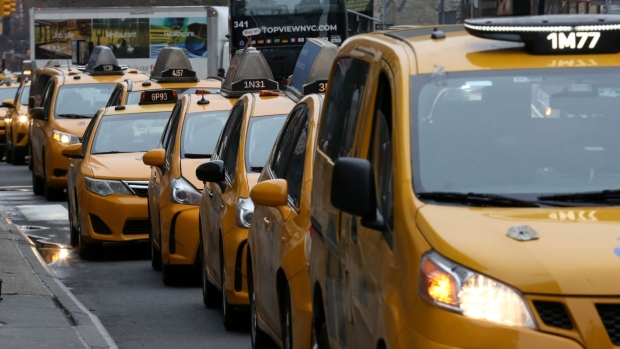Nov 15, 2022
NYC Taxicab Fares to Rise 23% in First Increase Since 2012
, Bloomberg News

(Bloomberg) -- New York City taxi riders will see a 23% increase in metered fares following a Tuesday vote from the city’s Taxi and Limousine Commission.
Passengers will also face an increase in rush hour and overnight surcharges, and airport flat rates, according to a document released by the TLC. The increases will also affect per-mile and per-minute rates for Uber Technologies Inc. and Lyft Inc., marking the first raise for drivers in a decade.
“Raising taxi fare rates and minimum pay for high-volume drivers is the right thing to do for our city,” TLC Commissioner David Do said in a statement. “We are confident that today’s unanimous Commission vote will keep our taxi and FHV fleets sustainable and ready to serve New Yorkers.”
For taxis, the metered rate will rise to $3.00 from $2.50, with surcharges rising to $2.50 from $1.00 during rush hour. The fee on overnight rides will rise to $1.00 from 50 cents. The flat fare to John F. Kennedy International Airport will jump to $70 from $52.
That would make the average taxi ride cost $19.62 compared to $15.97, when factoring in the drop fare and unit rate increases, according to the document. The new rates are expected to go into effect before year-end, the TLC said.
Uber and Lyft driver pay rates will increase by 7% per minute and 24% per mile. A sample trip of 30 minutes and 7.5 miles will require a minimum pay of $27.15, documents show.
Drivers were seeking higher fares after pandemic labor shortages and surging inflation.
“After a year of all drivers having to choose between food and fuel, and a decade of not just stagnation but loss for yellow cab drivers in particular, we’re relieved to see the raise be voted on,” The New York Taxi Workers Alliance, a 25,000-member union of yellow cab and Uber and Lyft drivers Executive Director Bhairavi Desai said in a statement.
While saying that moving away from dynamic pay rates was “long overdue,” Uber was critical of the change, saying that the city passing a rule that “won’t be guided by economic reality going forward hurts riders, drivers and the agency’s credibility,” according to a spokeswoman. The change may impact how much money Uber collects from each ride.
Lyft did not immediately respond to a request for comment.
--With assistance from Jackie Davalos.
(Updates throughout with additional details from the TLC, driver union and Uber.)
©2022 Bloomberg L.P.





